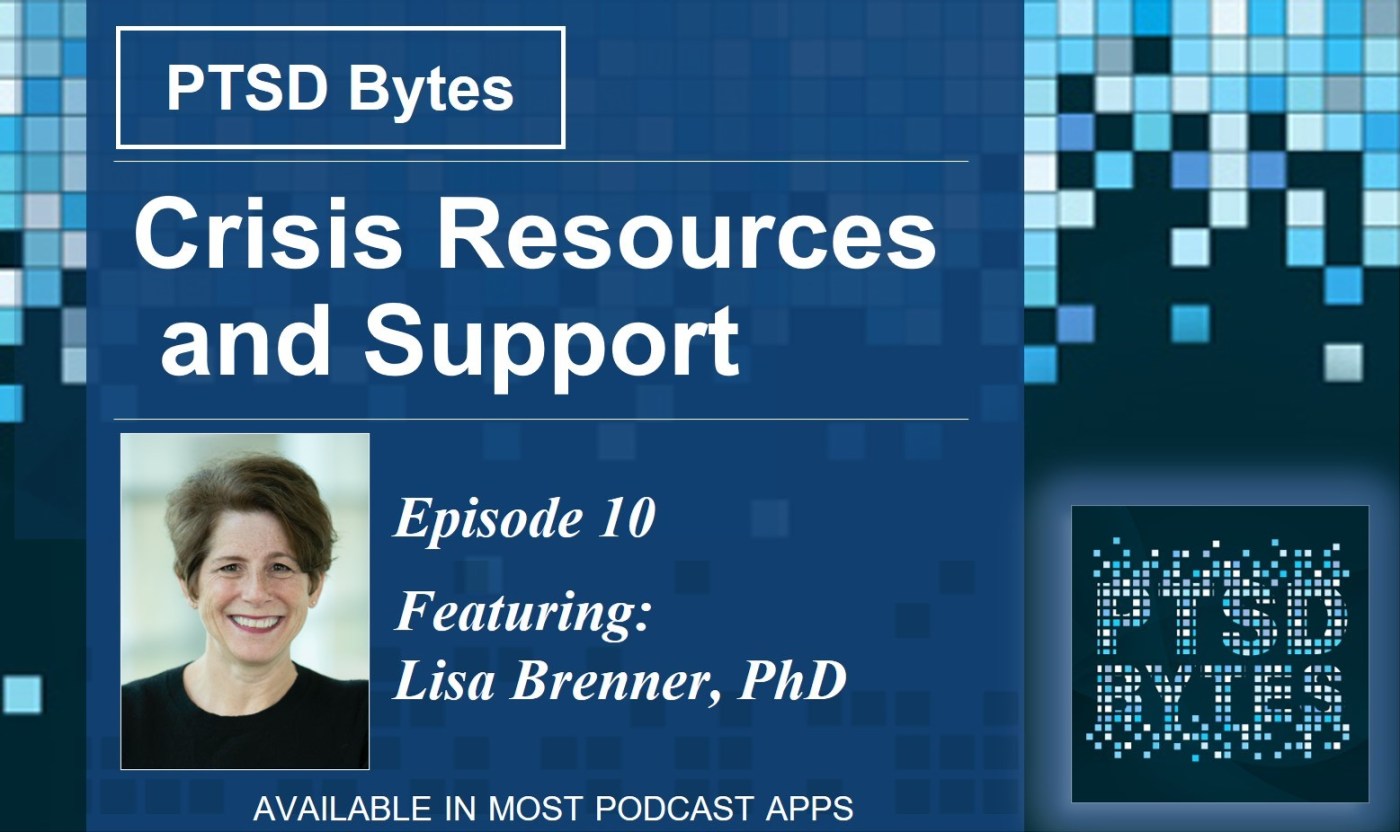In this episode of PTSD Bytes, host and clinical psychologist Pearl McGee-Vincent from the VA National Center for PTSD discusses crisis support resources with Dr. Lisa Brenner, rehabilitation psychologist and director of the VA Rocky Mountain Mental Illness Research Education and Clinical Center for Suicide Prevention.
Listen to “#10: Crisis Resources and Support” on Spreaker.
What is a mental health crisis?
Dr. Brenner explains that a crisis can look different for different people. A common definition for crisis is when stressors build up and overwhelm your ability to cope. A coping strategy is anything you do to deal with a stressful situation. Some coping strategies are simple and similar for a lot of people.
Getting a good night’s sleep, having a good diet and exercising are all coping strategies. There are also other coping strategies that work for different people. These are anything that make you feel a little calmer and more in control, such as listening to music.
Detecting a crisis
Dr. Brenner recommends paying attention to how you feel before a crisis occurs. This way, you can recognize when things change. It might mean you’re headed towards a crisis. For example, you might realize that you’re starting to have trouble sleeping or concentrating. It’s also helpful to identify your triggers, or types of events that can take an emotional toll on you. That way you can plan ahead for situations you know are triggering.
Dr. Brenner notes that if you are worried about a loved one having a crisis, you can pay attention to changes in his or her behavior. You might notice your loved one is more agitated or drinking alcohol more frequently. These could be signs your loved one is headed towards a crisis.
Veterans Crisis Line
If you or your loved one is feeling overwhelmed, hopeless or thinking about suicide, you can contact the Veterans Crisis Line for help. The Crisis Line is a free resource that can help you manage whatever level of difficulty you’re experiencing. No problem is too big or too small. You’re encouraged to call the Crisis Line as soon as possible. You may be able to prevent a crisis from happening.
The people at the Crisis Line are trained to help you and talk you through ways to stay safe and find further care. For the Veterans Crisis Line, call 1-800-273-8255 and then press 1. The Veterans Crisis Line is designed for Veterans, military members, family members and other loved ones. You can also chat with them online or text them at 838255 instead. These resources are also available in Spanish.
Safety plans
A safety plan is a set of strategies you can put in place before a crisis happens to help keep you safe. This could include listing people you can talk to, connecting to the Crisis Line, and other coping strategies. Safety planning is one of the features of the PTSD Coach mobile app, where you can easily create, use and update your plan. Veterans Crisis Line staff can also help you create your plan.
Video Introduction to Creating a Safety Plan in the PTSD Coach app.
Additional Links:
- Veterans Crisis Line website in Spanish: Sitio para la Línea de Crisis para Veteranos en español.
- Suicide Prevention Lifeline website for the general public.
- More PTSD Bytes episodes.
Topics in this story
More Stories
Watch the Under Secretary for Health and a panel of experts discuss VA Health Connect tele-emergency care.
The 2024 National Veteran Suicide Prevention Annual Report provides the foundation for VA’s suicide prevention programs and initiatives.
Theranostics is a specialized field of nuclear medicine that uses a two-pronged approach to diagnose and treat cancer.







Can someone tell me what else needs to be modified?
Hello, is anyone there?
I want to tell Vets about TMS, a PTSD treatment. Why can’t I post? It may be costing lives.
To the VA: quite frankly Veterans struggling with PTSD and severe Depression need far more than a Crisis line to talk them off of the ledge. Also antidepressants aren’t the answer for most Vets either. Now there is a very effective option that is NEVER mentioned by the VA that they are definitely aware of, which they cover 100%. They will outsource therapy to an outside clinic. It is called TMS (Trans cranial Magnetic Stimulation) AND IT REALLY WORKS!!! IT’S A PARADIGM SHIFT THAT WE VETS HAVE BEEN NEEDING SINCE ALL WARS WERE STARTED. NOW IT’S HERE! I was treated at Restorative Brain Center in Kansas City. FINALLY after 47 years of flailing around aimlessly, I found a therapy that ACTUALLY WORKS. Vets must ask their VA psychiatrist to try it. And they will write you a script for you to go to TMS Clinic. It’s NON-INVASIVE AND NOT SHOCK TREATMENT. PLEASE check out. They have the best expertise because they converse with the leading TMS doctors in the world at Stanford and in Toronto. RBC has now helped many Vets and civilians. Help us get the word out for the sake of our comrades. IF 22 VETS PER DAY ARE COMMITTING SUICIDE, SOMETHING ISN’T WORKING WELL ENOUGH. VETS NEED TMS NOT WORD SALAD.